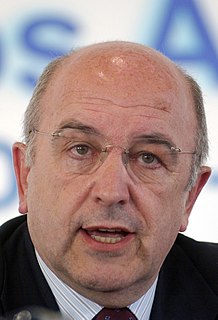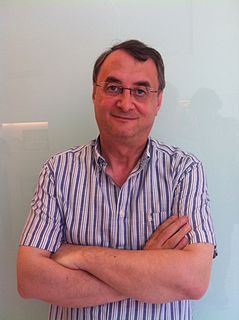
Josep Borrell Fontelles is a Spanish Argentine politician serving as High Representative of the Union for Foreign Affairs and Security Policy since 1 December 2019. A member of the Spanish Socialist Workers' Party (PSOE), he served as President of the European Parliament from 2004 to 2007 and as Minister of Foreign Affairs, European Union and Cooperation in the Government of Spain from 2018 to 2019.

Terra Lliure, sometimes referred to as TLL, was a Catalan nationalist paramilitary group. Formed in 1978, the group carried out hundreds of attacks that left many people injured and five dead.

Joaquín Almunia Amann is a Spanish politician and formerly, prominent member of the European Commission. During his tenure in the two Barroso Commissions, he was European commissioner responsible for economic and monetary affairs (2004–2009) and, subsequently, vice-president and the European Commissioner for Competition (2009–2014). Previously, he had been Spanish Minister for Employment (1982–1986) and Public Administrations (1986–1991). From 1997 to 2000, he was the leader of the opposition as secretary general of the Spanish Socialist Workers' Party, standing in and losing the 2000 Spanish general election against the then incumbent Spanish prime minister, José María Aznar.
Iraultza was a small Basque militant armed group of leftist tendency, active between 1982 and 1996 as a response to the suppression of the Basque resistance movement. It was thought to be a group of less than 50 people based in Bilbao, largely focused on the destruction of property, particularly those of American multinational corporations and against other smaller Spanish companies involved in labor disputes, in support of Workers' self-management and mobilization, although one of its attacks was responsible for the death of one individual and several for minor injuries of others. According to newspaper El País it was thought to be responsible for over 210 attacks during its existence.

Vicent Partal is a spanish journalist and director of VilaWeb. He has also worked in El Temps, Diari de Barcelona, TVE, Catalunya Ràdio, El Punt, and La Vanguardia, among others. He is considered an Internet pioneer.
Xarnego (Catalan pronunciation: [ʃərˈnɛɣu] in Catalan or charnego in Spanish is a pejorative or descriptive term used primarily in the 1950s–70s in Catalonia to refer to economic migrants from other typically poorer regions of Spain such as Andalusia or Extremadura. In its modern usage, it refers to Catalans with recent heritage from other Spanish-speaking parts of Spain. The word is used solely in the context of internal migration.
Socialist Party of National Liberation - Provisional was a pro-Catalan independence political party in the Catalan Countries. The PSAN-P was formed in 1974, as a split of the Socialist Party of National Liberation (PSAN). The main leaders of the party were Carles Castellanos, Eva Serra i Puig and Agustí Alcoberro.

Antoni Comín, born in Barcelona on March 7 1971, is a Catalan intellectual and politician from Spain. He is currently the executive vice-president of the Council for the Republic and has been an MEP since July 2019. He is the fourth child of the politician and intellectual Alfonso Carlos Comín i Ros and Maria Lluïsa Oliveres i Sanvicens, whose other children are Maria, Pere and Betona. He is the partner of the stage designer Sergi Corbera, and they have a daughter called Laia.
Catalonia Yes is a Catalan independence political platform founded in 2011 bringing together people from civil society and various public figures in favour of independence for Catalonia.

Societat Civil Catalana is a Barcelona-based grass-roots organisation that was created in 2014 with the aim of promoting Catalonia’s union to Spain. Most of SCC activities seek to counter the Catalan independence movement. SCC was officially launched on 23 April 2014.

María Margarita Robles Fernández is a Spanish judge and politician, currently serving as Minister of Defence since June 2018. From November 2019 to January 2020, she served as Acting Minister of Foreign Affairs.
Francisco Cano Consuegra. He was a politician of the People's Party (PP)., assassinated by the Basque separatist group ETA on 14 December 2000.
Jesús María Pedrosa Urquiza .He was a Spanish politician victim of terrorism of ETA.
José Ignacio Iruretagoyena was a Spanish politician and victim of terrorism of the Basque separatist group Euskadi Ta Askatasuna (ETA).
José Luis Caso Cortines was a Spanish politician, a victim of ETA.
Juan de Dios Doval Mateo. He was a politician and professor at the Law Faculty of San Sebastian who was assassinated by the Basque separatist group ETA.
Luis Candendo Pérez was a Spanish politician victim of ETA's terrorism.
Manuel Zamarreño Villoria was a Spanish politician assassinated by Basque terrorist group ETA

Alicia Miyares Fernández is a Spanish philosopher, feminist, researcher, and women's rights activists. She has served as the spokesperson for several feminist organizations including anti-womb renting No Somos Vasijas and Recav. She has been involved with the efforts to keep abortion legal, writing the manifesto for the 2014 Tren de la Libertad. Miyares Fernández was active in advocating feminist causes ahead of the 2019 Spanish general elections.
Patria (2016) is a novel by the Spanish writer Fernando Aramburu, published by Tusquets Eds. The story takes place in the Basque Country, at the time when ETA declared disbandment.







